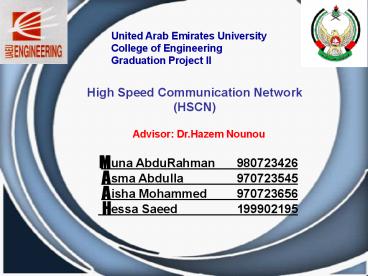United Arab Emirates University - PowerPoint PPT Presentation
1 / 24
Title:
United Arab Emirates University
Description:
The available bandwidth for ABR, n , may change in an ... for(i=1:p) zeta(k 1)=alfa(i).*zeta(k) Betan(i).*randn(1,1) end. end. for(m=1:M) ini=D(m) 1; ... – PowerPoint PPT presentation
Number of Views:109
Avg rating:3.0/5.0
Title: United Arab Emirates University
1
United Arab Emirates University College of
Engineering Graduation Project II
High Speed Communication Network (HSCN)
Advisor Dr.Hazem Nounou
M
una AbduRahman
980723426
A
sma Abdulla
970723545
A
isha Mohammed
970723656
H
essa Saeed
199902195
2
Main Headings
Presentation Outline
Introduction
Gantt chart
Presentation Outline
Algorithm 1
Introduction
Simulations Results
Gantt Chart
Algorithm 1
Simulations Results
Algorithm 2
Algorithm 2
Simulations Results
Simulations Results
Safety
Cost
Safety
Conclusion
Cost
Conclusion
3
Gantt Chart
Figure1
4
Performance Criteria
- Queue length must regulated at bottleneck nodes
around a desirable level. - Fairness
5
Basic Model of ATM Switch
Figure2 ABR Network Topology
6
Basic Model of ATM Switch
ABR traffic management model
7
A Certainty Equivalent Controller
- The available bandwidth for ABR, µn , may
change in an unpredictable way since the
transmission rate of VBR traffic is time
varying. - The bandwidth available to the controlled
sources, on the other hand, is subject to further
uncertainty due to the variations in the
uncontrolled traffic.
8
A Certainty Equivalent Controller
9
Algorithm I A Certainty Equivalent Controller
µ is the constant nominal service rate, rn is
the nominal rate of uncontrolled sessions, p is
the order of the AR process, ai ,i1,.., p are
the parameters characterizing the process, fn
,n 1 is a zero-mean Gaussian sequence with
variance k2.
10
Fairness Model
Figure 3 Fairness configuration model
Table1 Action delay for fairness model
11
Fairness Model
(1)
(2)
Running the Simulation by signing km s are
priority factor are equal for each source. Exact
fair sharing implies am1/ M,
Figures (1),(2) (3) Fairness model Source
rates
(3)
12
Fairness Model
Figure4 Fairness configuration model
Figure5 Fairness model Queue length under
controller 1
13
Max-min Fairness
Figure 5 Max-min fairness configuration model
14
Max-min Fairness Model
Figure 6 Max-min fairness configuration model
Table2 Action delay for Max-min fairness model
15
Max-min Fairness Model
Figure 7 Max-min fairness configuration model
Table3 Action delay for Max-min fairness model
16
Max-min Fairness Model
Figures 8 Max-min fairness model Source rates
17
Simulation
Optimal Controller Algorithm Optimal solution
characterized in terms of the solution of a
discrete time riccati equation. The basic idea
is to introduce new variables for the past
controls of the DMs that have nonzero
information delay. Convert the problem to an
equivalent linear quadratic regulator
18
Simulation
Optimal Controller Algorithm
For 4 switches
19
Simulation Results
Figure 9 Optimal Controller Results
20
Simulation Results
Figure 10 Optimal Controller Results
21
Matlab code
D 0 1 3 3n100p4M4zeta(1,1) -1 gama1
1 xrand(1,n)alfa0.4 0.4 0.4 0.4
for(k1n) for(i1p)
zeta(k1)alfa(i).zeta(k)Betan(i).randn(1,1) en
d end for(m1M)
iniD(m)1 for(kinin) if (klt
D(m)-1) u(m,k)0 else
u(m,k)gamax(k-D(m))zeta(k-D(m))
end end end
22
Safety..
23
Cost..
24
Conclusion
The ABR plays a rule in regulating the network
traffic using Explicit rate. ABR max-min model
approach high bandwidth utilization. The
simulations shows that the capacity is fairly
shared among all sources . The need of high
performance algorithms ATM congestion control
algorithms are an open issue.
25
Thanks for your time
Have a nice Day































